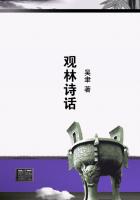Here, too, he was intimate with young Julian, afterwards the "Apostate" Emperor of Rome. Basil then visited the schools of Alexandria, and made the acquaintance of the great Athanasius, as well as of those monks who sought a retreat amid Egyptian solitudes. Here his conversion took place, and he parted with his princely patrimony for the benefit of the poor. He then entered the Church, and was successively ordained deacon and priest, while leading a monastic life. He retired among the mountains of Armenia, and made choice of a beautiful grove, watered with crystal streams, where he gave himself to study and meditation. Here he was joined by his friend Gregory Nazianzen and by enthusiastic admirers, who formed a religious fraternity, to whom he was a spiritual father. He afterwards was forced to accept the great See of Caesarea, and was no less renowned as bishop and orator than he had been as monk. Yet it is as a monk that he left the most enduring influence, since he made the first great change in monastic life,--****** it more orderly, more industrious, and less fanatical.
He instituted or embodied, among others, the three great vows, which are vital to monastic institutions,--Poverty, Obedience, and Chastity. In these vows he gave the institution a more Christian and a less Oriental aspect. Monachi** became more practical and less visionary and wild. It approximated nearer to the Christian standard. Submission to poverty is certainly a Christian virtue, if voluntary poverty is not. Chastity is a cardinal duty.
Obedience is a necessity to all civilized life. It is the first condition of all government.
Moreover, these three vows seem to have been called for by the condition of society, and the prevalence of destructive views.
Here Basil,--one of the commanding intellects of his day, and as learned and polished as he was pious,--like Jerome after him, proved himself a great legislator and administrator, including in his comprehensive view both Christian principles and the necessities of the times, and adapting his institution to both.
One of the most obvious, flagrant, and universal evils of the day was devotion to money-****** in order to purchase sensual pleasures. It pervaded Roman life from the time of Augustus. The vow of poverty, therefore, was a stern, lofty, disdainful protest against the most dangerous and demoralizing evil of the Empire. It hurled scorn, hatred, and defiance on this overwhelming evil, and invoked the aid of Christianity. It was simply the earnest affirmation and belief that money could not buy the higher joys of earth, and might jeopardize the hopes of heaven. It called to mind the greatest examples; it showed that the great teachers of mankind, the sages and prophets of history, had disdained money as the highest good; that riches exposed men to great temptation, and lowered the standard of morality and virtue,--"how hardly shall they who have riches enter into the kingdom of God!" It appealed to the highest form of self-sacrifice; it arrayed itself against a vice which was undermining society. And among truly Christian people this new application of Christ's warnings against the dangers of wealth excited enthusiasm. It was like enlisting in the army of Christ against his greatest enemies. Make any duty clear and imperious to Christian people, and they will generally conform to it. So the world saw one of the most impressive spectacles of all history,--the rich giving up their possessions to follow the example and injunctions of Christ. It was the most signal test of Christian obedience. It prompted Paula, the richest lady of Christian antiquity, to devote the revenues of an entire city, which she owned, to the cause of Christ; and the approbation of Jerome, her friend, was a sufficient recompense.
The vow of Chastity was equally a protest against one of the characteristic vices of the day, as well as a Christian virtue.
Luxury and pleasure-seeking lives had relaxed the restraints of home and the virtues of earlier days. The evils of concubinage were shameless and open throughout the empire, which led to a low estimate of female virtue and degraded the ***. The pagan poets held up woman as a subject of scorn and scarcasm. On no subject were the apostles more urgent in their exhortations than to a life of purity. To no greater temptation were the converts to Christianity subjected than the looseness of prevailing sentiments in reference to this vice. It stared everybody in the face. Basil took especial care to guard the monks from this prevailing iniquity, and made chastity a transcendent and fundamental virtue.
He aimed to remove the temptation to sin. The monks were enjoined to shun the very presence of women. If they carried the system of non-intercourse too far, and became hard and unsympathetic, it was to avoid the great scandal of the age,--a still greater evil. To the monk was denied even the blessing of the marriage ties.
Celibacy became a fundamental law of monachi**. It was not to cement a spiritual despotism that Basil forbade marriage, but to attain a greater sanctity,--for a monk was consecrated to what was rightly held the higher life. This law of celibacy was abused, and gradually was extended to all the clergy, secular as well as regular, but not till the clergy were all subordinated to the rule of an absolute Pope. It is the fate of all human institutions to become corrupt; but no institution of the Church has been so fatally perverted as that pertaining to the marriage of the clergy.
Founded to promote purity of personal life, it was used to uphold the arms of spiritual despotism. It was the policy of Hildebrand.
The vow of Obedience, again, was made in special reference to the disintegration of society, when laws were feebly enforced and a central power was passing away. The discipline even of armies was relaxed. Mobs were the order of the day, even in imperial cities.















